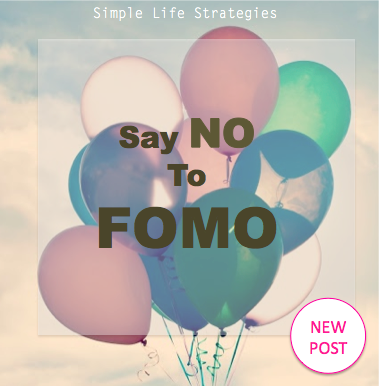Have you ever pushed yourself to do something because of a nagging feeling that you might miss out? You know those times where you’re physically exhausted and know that the best solution for you right now is rest, yet you drag yourself out anyway. If this situation sounds familiar to you, then it’s likely you suffer from the latest first world problem otherwise known as FOMO: fear of missing out.
I have a bone to pick with FOMO – because it’s turned into something that’s now socially acceptable. I don’t know if the acronym has somehow made it OK, but there also seems to be an element of pride associated with claims of FOMO. It’s as if people are competing against each other to see who can attend the most social or work events.
What is FOMO?
When you drill down a little, just what is FOMO? The official definition is:
“A fear of one’s social standing or how one is perceived among peers, and a need to constantly know what is happening and what others are doing.”
So as we stress about what everyone else is up to, social media only fans the flames as now, more than ever, we are shown what we’re missing out on minute, by minute; second by second. Think about it. Before social media, how did we even know what other people were up to? We were blissfully unaware that Sarah was attending an exclusive launch event this Friday, or Jack was launching a new multimillion dollar business. It’s only now that people are sharing every millisecond of their lives online, that we have the awareness to fuel our ever-expanding FOMO.
The Dangers of FOMO
So isn’t FOMO just harmless fun? I think for some, yes. But if you’re finding yourself double, triple or even quadruple booking yourself out each week then you might need to take a step back and reclaim some of your time for you. And in my experience, it’s not just social events that people are over-committing to, it’s also work events too. Never has there been such competition to keep up with the Joneses (especially when they are constantly broadcasting their successes on Facebook and Instagram).
The thing is, FOMO drains us of valuable re-charge time where we can rest and fill up the tank. It’s like a hungry vampire that sucks away all of our valuable energy supplies. We seem to have moved to an age where there is little concern for replenishment. We put so much pressure on our bodies to perform and to just keep on going that we forget the basic need to put back in what we take out. In-fact, research has shown that FOMO is a serious disorder that can even cause anxiety, stress and depression.
FOMO is fear in action
When you think about it, the first word is a bit of a giveaway – FEAR. In my opinion, FOMO is nothing more than another form of negative thinking wrapped up as the latest cool ailment for busy, socialites.
But any kind of prolonged fear is not great for our health. If we are constantly chasing our FOMO then at some point we will burn out. It’s simply not possible to do everything. So we need to take a step back and focus only on those things that are truly important to us.
Lack of awareness
Another possible driver for FOMO is a lack of awareness of self. If we are constantly being pulled in all directions by how other people are living their lives, where dare I ask is our own life plan? Why do we feel the need that what everyone else is doing is more fun? Once we truly know what makes us happy and what our personal values are, we have no need to be living everyone else’s lives. As Steve Jobs once said:
“Your time is limited. Don’t waste it living someone else’s life.”
Low self esteem
Finally, it makes sense to me that FOMO is a side effect of low levels of self-esteem. A desire to ‘not miss out’ suggests that we are not good enough in the first place. It’s almost as if, at some deep level, we place conditions on our own self worth and we are only good enough, if we are involved in everything that’s going on.
I have to admit, I have struggled with FOMO myself in the past, but for me, once I realised that there really is nothing to miss out on, I found it much easier to say no to things. Plus, life is alot less stressful if you’re not having to worry about what everyone else is doing. I even came up with my own healthier alternative to FOMO called:
SOSI: Satisfaction of staying in!
I highly recommend kicking FOMO to the curb and taking up SOSI!
Simple Life Strategy: 7 Tips to Squash FOMO
1. Evaluate your current schedule. Do you have much time to rest? Are you frequently double-booking yourself? Do you find yourself constantly cancelling because you have over-committed?
2. If your schedule is somewhat packed out, take some time to schedule in one or two nights a week where you stay in. Notice any feelings that pop up when you do this.
3. If you find it difficult to take step 2, try to get to the bottom of what the issue is. Just what are you missing out on?
4. Take some time out from social media. Instead of being glued to Facebook and what other people are doing, commit to a personal project and focus on yourself for a change.
5. Cast your mind back to the number of times you have gone out and regretted it. Look at the situation realistically. How much are you really missing out on?
6. Remind yourself that you are enough – with or without attending every single social or work event.
7. Make peace with the fact that it’s not possible to do it all – and that a desire to do so only fuels feelings of anxiety which is no way to live.
Know someone who suffers with FOMO? Share this article with them!
More Simple Life Strategies:
-
Harvard Research: How Thoughts Affect the Brain
-
How to Use Intuition to Your Advantage
-
How to Be Successful and Happy
Image source: Pinterest
PS ~ Sick of working just to pay the bills? Get my most popular, FREE online training here: My 3 Step process To Find A More Meaningful Career.
Join 108,000 beautiful souls on the Simple Life Strategies Facebook page to get access to articles before anyone else!




That’s a great exposition on FOMO. You are such a motivational writer Zoe B. I have picked really important virtues from your post.
The part you mentioned low self esteem and social standing really caught my attention.
Thanks for sharing, hope you have a great weekend.
Those are great tips! I am one that does not have this fear!